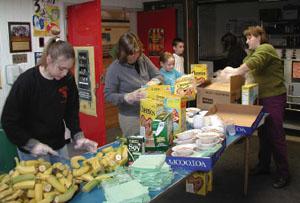Co-ops to Classrooms

Ask yourself this: How many of your local schools are using your co-op as a source of food and food education? If you would like to see that number increase, read on.
As our nation prepares itself to battle against childhood obesity, co-ops should position themselves to be heroes in this food fight. There is strong momentum building to improve school food programs all across the country, giving co-ops easy opportunities to ride the wave of change.
By September 2006, any school participating in the federal school meal program will be required to have a school wellness policy in place. Within this policy, schools will be encouraged to evaluate nutrition guidelines for all foods available during the school day. This means that schools will be forced to re-think what is served for snacks, lunches, from vending machines, and even at bake sales. This is a perfect time for your co-op to incorporate the money and staffing needed to develop action plans that place your store as a leading resource for health food and education in your community.
Fast-food marketing geniuses have been promoting white bread, trans-fats, and sugar to children for years; thus, the continual re-birth of fast food junkies. However, as the national momentum for healthier foods steamrolls through mainstream America, these same corporations are scurrying to become what co-ops have been all along: a source for whole grains and natural choices.
While corporations are catching up to meet the demand for healthier foods, co-ops should be taking giant steps to highlight their affordable natural food offerings through outreach and education. If you don’t, your competitors will. Large food chains are already offering some similar foods, and it won’t be long before they are offering similar programs. Hannaford Brothers, a large food chain in the Northeast, is piloting a program offering a special food section and nutritionist services for customers allergic to wheat. Many national chains also give schools money based on a percentage of grocery purchases.
Taking the “good word” and the “good food” of our stores into the world outside our doors is the right thing to do and can only help distinguish co-ops from other grocery stores. Instead of building classrooms in the co-op, bring the co-op to the classroom.
Classroom education
Some co-ops have already seen quick results from offering schools a handful of services. (See the list at the end of this story.)
Teachers are hungry for any support in raising students’ awareness about how to make healthy food choices. Lessons designed around reading food labels, reducing sugar intake, identifying fats, and challenging food commercials are key. This is an opportunity for co-op educators to visit classrooms, talk about co-ops, and familiarize students with healthier food choices.
Rarely do conventional schools introduce the cooperative movement to our youth. Offering additional lessons about the cooperative business model can easily meet a school’s social studies or history standards.
Healthy snack program
Thousands of children bring snacks to school every day. Your education or marketing department needs to give parents every reason to buy those snacks from your co-op. Helping people realize that co-ops are a source for affordable, delicious, and healthful snacks should be a priority in annual business plans. Offering a healthful snack discount program to schools and childcare centers encourages teachers and parents to buy products from the co-op, entices students to try new foods, and, with the right promotion, can create an awareness of co-ops in the whole community.
School foodservice
All across the country, school foodservices are struggling to incorporate more whole grains, more fresh vegetables, and more local foods with no extra cost. While this seems like a nearly impossible task, co-ops might explore ways they could be used as a resource for school menu planning, taste tests, and networking schools with local farmers. Co-ops may also consider offering discounted purchasing programs for school cafeterias.
There is no mystery to establishing a relationship with schools, just a need for plenty of planning, promotion, and outreach. Retraining the way our youth chooses food is no easy task. Co-ops that participate in this education process guarantee themselves a new generation of
co-op shoppers. The investment of time and money is well worth the outcome.
Co-op examples
Here is a short list of how some co-ops are educating youth: *Community Mercantile*—Lawrence, Kans. Contact: Nancy O’Connor, 785/843-8544. Resources: classroom lessons, specialized food curriculums, store tours, education foundation, grant writing.
*Co-op to Kids Project*—A collaborative effort among several food co-ops in Vermont and New Hampshire. Resources: a web page with downloadable information for teachers, parents and foodservice professionals. Website: www.coop
foodstore.com/html/cooptokids/coops_to_kids.
htm. Contact: Mary Saucier Choate at the Co-op Food Stores, Hanover and Lebanon, N.H. Phone: 603/643-4889.
Quincy Natural Foods, Quincy, Calif. Contact: Lucinda Beardon, 530-283-3528. Resources: store tours, classroom lessons, educational DVD.
*Davis Food Co-op*—Davis, Calif. Contact: Julie Cross, [email protected], 530/758-2667. Resources: store tours, classroom lessons including art and storytelling, classes for parents.
*Midwest Food Connection*—Minneapolis, Minn. Contact: Uli Koester, [email protected],
612/874-7275, ext. 425. Programs: classroom lessons and farm tours.
To date there is little data indicating the number of co-ops with established school programs or the number of co-ops needing assistance to develop one. I would like to better understand the national need for sharing educational resources and the need for a co-op–based curriculum training. To share your story, email Lisa Ford.
Lisa Ford worked in the Brattleboro (Vt.) Food Co-op marketing department for seven years. She is the author of the children’s book and video, “A Trip to the Co-op” and the creator of a co-op snack program in schools, “Co-op to Classroom Curriculum and Guide to Developing School-Based Programs” ([email protected] or 802/579-7433).







